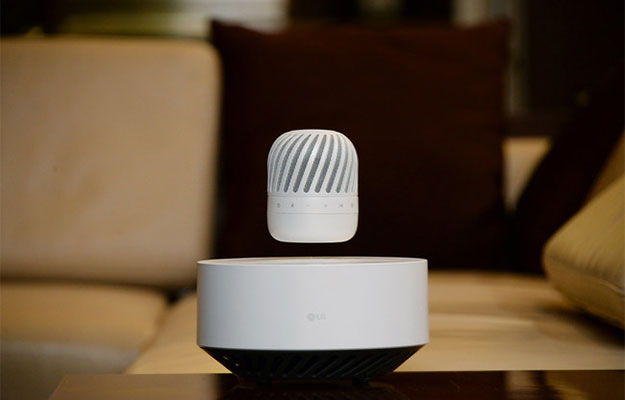LG To Bring Futuristic Levitating Bluetooth Speaker To CES 2017
Hermione Granger is going to be very disappointed that she no longer has to utter “Wingardium Leviosa”. LG plans to introduce its Levitating Portable Speaker (model PJ9) at CES 2017 in Las Vegas, Nevada next week.
Tim Alessi, head of product marketing at LG Electronics, remarked, “This latest addition to our growing lineup of premium wireless audio devices will not only turn heads, but it makes the bold statement that LG is committed to exploring new concepts and pioneering innovative audio designs for consumers around the world.”

How does the levitating speaker work? The Levitation Station contains electromagnets that help keep the PJ9 speaker afloat. Unlike the club that Ron Weasley used to knock out the troll, the speaker slowly descends to the station when low on battery. The speaker charges wirelessly without prompting from the user and without interrupting the music.
The “360-degree omnidirectional speaker” with “turbine blade-inspired design” not only looks pretty, but is supposed to sound great as well. A subwoofer augments the base, while Dual Passive Radiator technology enhances both mid-tone and high ranges. Multipoint technology also allows the speaker to connect to up to two Bluetooth devices.
To top it all off, the PJ9 and Levitation Station are easily portable, and the speaker is feature an IPX7 water resistance rating. This enables users to listen to music both inside and outside and in less than ideal weather conditions.
This is not the first device, or even the first speaker, to employ electromagnets for levitation. Brookstone, OM/ONE, and other companies have marketed levitating speakers for quite some time. There is even speaker that looks like the Death Star. This is perhaps, however, one of the first levitating speakers to be released by a major, tech-focused corporation.
There is currently no information on the pricing or availability for the PJ9 and Levitation Station. However, current levitating speakers range anywhere from $60 to $350.
Tim Alessi, head of product marketing at LG Electronics, remarked, “This latest addition to our growing lineup of premium wireless audio devices will not only turn heads, but it makes the bold statement that LG is committed to exploring new concepts and pioneering innovative audio designs for consumers around the world.”

How does the levitating speaker work? The Levitation Station contains electromagnets that help keep the PJ9 speaker afloat. Unlike the club that Ron Weasley used to knock out the troll, the speaker slowly descends to the station when low on battery. The speaker charges wirelessly without prompting from the user and without interrupting the music.
The “360-degree omnidirectional speaker” with “turbine blade-inspired design” not only looks pretty, but is supposed to sound great as well. A subwoofer augments the base, while Dual Passive Radiator technology enhances both mid-tone and high ranges. Multipoint technology also allows the speaker to connect to up to two Bluetooth devices.
To top it all off, the PJ9 and Levitation Station are easily portable, and the speaker is feature an IPX7 water resistance rating. This enables users to listen to music both inside and outside and in less than ideal weather conditions.
This is not the first device, or even the first speaker, to employ electromagnets for levitation. Brookstone, OM/ONE, and other companies have marketed levitating speakers for quite some time. There is even speaker that looks like the Death Star. This is perhaps, however, one of the first levitating speakers to be released by a major, tech-focused corporation.
There is currently no information on the pricing or availability for the PJ9 and Levitation Station. However, current levitating speakers range anywhere from $60 to $350.

